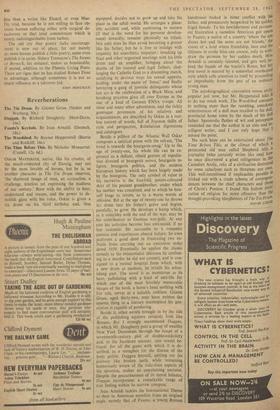Reverberations
The Woodshed. By Rayner Heppenstall. (Barrie and Rockliff. 16s.)
The Time Before This. By Nicholas Monsarrat. (Cassell, 12s. 6d.)
OSKAR MATZERATH, native, like his creator, of the much-contested city of Danzig, may not be the most lovable of heroes, but he is, as another character in The Tin Drum observes, `the shattered image of man, an accusation, a challenge, timeless yet expressing the madness of our century.' Born with the ability to hear, understand and reason, and the power to de- molish glass with his voice, Oskar is given a tin drum on his third birthday and, thus
equipped, decides not to grow up and take his place in the adult world. He arranges a plaus- ible accident and, while continuing to mature (if that is the word for his perverse develop- ment) inwardly, remains physically an infant.
Not only does he thus avoid becoming a grocer like his father, but he is free to indulge with impunity his anarchistic impulses: breaking up Nazi and other organised meetings with his little drum and an amplifier, bringing about the deaths of his natural and legal fathers, chal- lenging the Catholic God to a drumming match, satisfying in devious ways his sexual appetite, leading, under the name of 'Jesus,' and finally betraying a gang of juvenile delinquents whose last act is the celebration of a Black Mass, and breaking priceless glass all over Europe as the star of a kind of German ENSA troupe. All these and many other adventures, and the richly grotesque procession of his relatives and acquaintances, are described by Oskar in a rest- less torrent of words, full of Joycean shifts of style and perspective, Rabelaisian digressions and catalogues.
Beside a pillbox of the Atlantic Wall Oskar composes a satirical poem with the refrain, 'The trend is towards the bourgeois-smug.' Up to the age of twenty-one, his whole life can be ex- pressed as a defiant, ribald gesture of repudia- tion directed at bourgeois mores, bourgeois re- ligion, bourgeois politics, and the modern European history which has been largely made by the bourgeois. The only symbol of value in his narrative is the fourfold, potato-coloured skirt of his peasant grandmother, under which his mother was conceived, and to which he him- self longs to return, as to a warm womb of oblivion. But at the age of twenty-one he throws his drum into his father's grave and begins, painfully, to grow. He develops a hump which, as it coincides with the end of the war, may be his contribution to German war-guilt. At any rate his activities become less anti-social, if no less eccentric. He succumbs to a romantic passion and experiences absurd failure; he even performs a good deed in frustrating two ex- Nazis from carrying out an execution order dated 1939. Eventually he applies the classic remedy to the existentialist dilemma by confess- ing to a murder he did not commit, and is con- signed to a mental hospital from which, with a new drum as medium, he recalls his aston- ishing past. The novel is as monstrous as its hero, pullulating with a kind of anti-life for which one of the most horribly memorable images of the book, a horse's head seething with live eels, serves as a suitable emblem. Gunter Grass, aged thirty-two, may have written the nearest thing to a literary masterpiece his gen- eration is capable of producing.
Beside it, other novels brought in by the tide of the publishing equinox certainly look like
flotsam. But I strongly recommend Duggan, in which Mr. Dougherty puts a group of wealthy
New York Democrats through the hoops of a seventeenth-century plot of double-cuckoldry and, in the Jacobean manner, uses sexual be- trayal, for all the gusto with which it is de- scribed, as a metaphor for the disease of the body politic. Duggan himself, spitting out his jealousy like broken teeth, while remaining humorously aware of the ridiculous aspects of his situation, makes an entertaining narrator.
Despite the precariousness of its moral balance, Duggan incorporates a remarkable range of true feeling within its narrow compass.
Jean Arnaldi tackles the International Theme so dear to American novelists from an original angle, namely that of Fausto, a young Roman
hairdresser locked in bitter conflict with his father, and prematurely henpecked by his quirky, frigid fiancée. To his bewilderment and perman- ent frustration a nameless American girl opens to Fausto, a native of a country 'where the sun shines hot and the sexes are not friends,' the vision of a land where friendship, love and the ultimate in erotic bliss can coexist, only to with- draw the promise by her sudden death. Ass Arnaldi is certainly talented, and gets well be- hind the façade of the tourist's Rome, but her first novel is marred by a somewhat overheated style which calls attention to itself by proceeding so improbably from the pen of an ordinary young man.
The autobiographical convention seems eerily popular just now, but Mr. Heppenstall asks it to do too much work. The Woodshed amounts to nothing more than the rambling, anecdotal reminiscences of a dull man recalled to his dull, provincial home town by the death of his dull father. Spasmodic flashes of wit and perception reminded me that the author is an able and in- telligent writer, and I can only hope that missed the point. No such hope can be entertained about The Time Before This, at the climax of which 3 persecuted old man called Shepherd tells a journalist (who certainly writes like one) WO he once discovered a giant refrigerator in the, Canadian Arctic, relic of a civilisation destroyed by some cataclysm such as threatens our own' This well-intentioned if implausible parable IS tricked out with a crude scheme of correspon- dences between the chief characters and those of Christ's Passion. I found this hollow invo- cation of religion far more offensive than the thought-provoking blasphemies of The Tin Orion.
DAVID LODGE


































 Previous page
Previous page